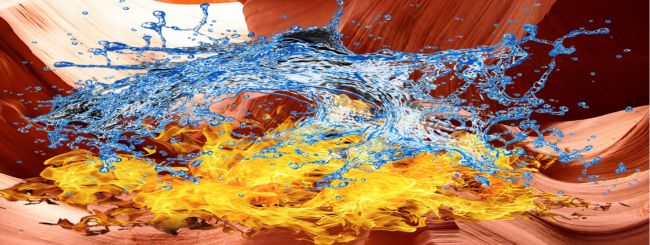If we look at what elements are associated with giving the Torah we see:
1 Fire – Shemot 19:18 – וְהַ֤ר סִינַי֙ עָשַׁ֣ן כֻּלּ֔וֹ מִ֠פְּנֵ֠י אֲשֶׁ֨ר יָרַ֥ד עָלָ֛יו ה’ בָּאֵ֑שׁ וַיַּ֤עַל עֲשָׁנוֹ֙ כְּעֶ֣שֶׁן הַכִּבְשָׁ֔ן וַיֶּחֱרַ֥ד כׇּל-הָהָ֖ר מְאֹֽד׃
Now Mount Sinai was all in smoke, for G-d had come down upon it in fire; the smoke rose like the smoke of a kiln, and the whole mountain trembled violently.[1]
2 Water – Judges 5:4 – ה’ בְּצֵאתְךָ֤ מִשֵּׂעִיר֙ בְּצַעְדְּךָ֙ מִשְּׂדֵ֣ה אֱד֔וֹם אֶ֣רֶץ רָעָ֔שָׁה גַּם־שָׁמַ֖יִם נָטָ֑פוּ גַּם־עָבִ֖ים נָ֥טְפוּ מָֽיִם׃
O L-rd, when You came forth from Seir, Advanced from the country of Edom, The earth trembled;
The heavens dripped,Yea, the clouds dripped water,[2]
3 Desert. ‘Desert’ is derived from the verse ‘G-d spoke to Moshe in the desert of Sinai’, the opening verse of this week’s Parsha. [3]
וַיְדַבֵּ֨ר ה’ אֶל־מֹשֶׁ֛ה בְּמִדְבַּ֥ר סִינַ֖י בְּאֹ֣הֶל מוֹעֵ֑ד בְּאֶחָד֩ לַחֹ֨דֶשׁ הַשֵּׁנִ֜י בַּשָּׁנָ֣ה הַשֵּׁנִ֗ית לְצֵאתָ֛ם מֵאֶ֥רֶץ מִצְרַ֖יִם לֵאמֹֽר׃
On the first day of the second month, in the second year following the exodus from the land of Egypt, the L-rd spoke to Moses in the desert of Sinai, in the Tent of Meeting, saying…
Fire, water and desert all three can be seen as impurities fed by the Evil inclination.
1 Fire is associated with passion, the temptation for unholy things such as sexual temptations, no fire hotter than passion, material pleasures like expensive clothes, cars, etc.
2 Water is assiated with loving the wrong things. Having Loving-Kindness for wrong moral, ethical values and norms, religious systems, idols, etc.
3 Desert can be associated with the concept of “hefkar”. In the Shmita year (the year when the land of Israel has a full year of rest), the land is ownerless, and anyone may take from all the fruits that grow everywhere). The farmers’ lands have no boundaries. It is a lack of boundaries, limits of one’s own ego. The lack of humility.
If we take on the Kingship of Hashem, it can only be done in humility. The Baal Shem Tov teaches that a person who is humble (has no narcissism, ego, sense of grandeur) easily becomes one who fears (is close) to G-d. [4] The “ego” stands between us and G-d. The “ego” who thinks he can do it himself and does know himself and wants to decide for himself how he wants to live. It all starts in the desert, when we accept that G-d has no limits and that we humans are small and bounded.
As we can also read in Eiruvin 54a:
“When a man makes himself like a wilderness, which is hefker — ownerless, upon which everyone treads, the Torah is presented to him as a gift”.
This humility creates fear and awe for G-d, which leads to loving-kindness for G-d. It makes us want to serve Him and live according to His values and standards. But that does not mean we can immediately unlearn all our bad traits. That we immediately understand all G-d’s laws. But it takes perseverance.It was this sign of water which made Rabbi Akiva decide to study Torah later in life because he saw that the water wore down the stone. So Rabbi Akiva extrapolated that if something soft (water) can wear down something hard, all the more so something that is hard (Torah, the precepts of which can sometimes be hard to accept) can certainly “wear down” and influence something soft (his heart).[5]
Humility, fear and awe, this will make that our needs for material things will decrease, and we will focus more and more on spiritual treasures. Treasures we can acquire by studying Torah – The 7 Laws of Noah. Our hearts will burn for G-d and His Torah. Our hearts will be full of passion for G-d and His Torah.
Let us all worship and serve G-d, with perseverance, in the desert with water and fire.
By Angelique Sijbolts
[1] Exodus 19:18
[2] Judges 5:4
[3] Bamidbar 1:1
[4] Sayings of the Baal Shem Tov https://kabbalahwisdom.org/sayings-of-the-baal-shem-tov-kesser-shem-tov/
[5] Rabbi Akiba: A Drop of Water
Inspiration source נתיבות שלום
With thanks to B. Yaniger
© Copyright, all rights reserved. If you enjoyed this article, we encourage you to distribute it further.
